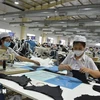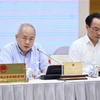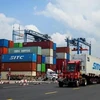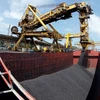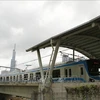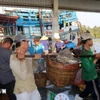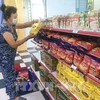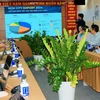Vietnamese businesses need to have a thorough understanding of Incoterms 2010 and World Trade Organisation commitments in the logistic sector to limit risks in international trade, a meeting held on Nov. 30 in HCM City heard.
Lawyer Vo Nhat Thang, of the Vietnam International Arbitration Centre (VIAC), said the newly revised version of standardised trade terms used in international sales contracts, Incoterms 2010, would help traders avoid costly misunderstandings by clarifying the tasks, costs, and risks involved in the delivery of goods.
The International Chamber of Commerce released Incoterms 2010 in September. Incoterms (short for International Commercial Terms) define the responsibilities of buyers and sellers for the delivery of goods under sales contracts.
Incoterms 2010 will take effect on January 1 next year. Since the last revision, Incoterms 2000, there have been a number of changes in both global and domestic trade.
In contrast to the previous four classes E, F, C and D, Incoterms will now separate into two groups, those applicable to all modes of transport and those only applicable to sea and inland waterway transportation.
Rules for any mode of transport include ex works, free carrier, carriage paid to, carriage and insurance paid to, delivered at terminal, delivered duty paid, and delivered at place.
Rules for waterway transport are Free Alongside Ship, Free on Board, Cost Freight, and Cost Insurance Freight.
There will now be a total of 11 terms instead of 13, with two new additions, Delivered At Place and Delivered At Terminal.
Previously, there was an Incoterms-related dispute involving four Vietnamese businesses in 2006 that imported animal feed worth 1.4 million USD due to unclear terms in the contract and limited understanding of Incoterms, Thang said.
At the seminar, Vu Xuan Phong, deputy director of VIAC, pointed out benefits of multi-modal transport to businesses and hoped it would be expanded nationwide. It would help them to reduce transportation costs, risks and curtail transportation times and shorten capital stagnancy.
He provided information about the ASEAN framework agreement on multimodal transport and Decree No.87 issued last year on responsibilities, provisions and license granting for multimodal transport businesses.
Nguyen Tuong, deputy head of the Ministry of Transport's International Cooperation Department, has been helping Vietnamese businesses improve their understanding about Vietnam's WTO commitments in the logistics sector.
Accordingly, after five years of WTO integration, Vietnam will allow wholly foreign-owned maritime and logistics companies to set up in Viet Nam and operate equally in the country.
Experts said the country should consider hastening development of a professional, local logistics industry.
The meeting was organised by the Vietnam Supply Chain in collaboration with HCM City Investment and Trade Promotion Centre, the Vietnam Ship Agents and Brokers Association and the Vietnam Freight Forwarders Association./.
Lawyer Vo Nhat Thang, of the Vietnam International Arbitration Centre (VIAC), said the newly revised version of standardised trade terms used in international sales contracts, Incoterms 2010, would help traders avoid costly misunderstandings by clarifying the tasks, costs, and risks involved in the delivery of goods.
The International Chamber of Commerce released Incoterms 2010 in September. Incoterms (short for International Commercial Terms) define the responsibilities of buyers and sellers for the delivery of goods under sales contracts.
Incoterms 2010 will take effect on January 1 next year. Since the last revision, Incoterms 2000, there have been a number of changes in both global and domestic trade.
In contrast to the previous four classes E, F, C and D, Incoterms will now separate into two groups, those applicable to all modes of transport and those only applicable to sea and inland waterway transportation.
Rules for any mode of transport include ex works, free carrier, carriage paid to, carriage and insurance paid to, delivered at terminal, delivered duty paid, and delivered at place.
Rules for waterway transport are Free Alongside Ship, Free on Board, Cost Freight, and Cost Insurance Freight.
There will now be a total of 11 terms instead of 13, with two new additions, Delivered At Place and Delivered At Terminal.
Previously, there was an Incoterms-related dispute involving four Vietnamese businesses in 2006 that imported animal feed worth 1.4 million USD due to unclear terms in the contract and limited understanding of Incoterms, Thang said.
At the seminar, Vu Xuan Phong, deputy director of VIAC, pointed out benefits of multi-modal transport to businesses and hoped it would be expanded nationwide. It would help them to reduce transportation costs, risks and curtail transportation times and shorten capital stagnancy.
He provided information about the ASEAN framework agreement on multimodal transport and Decree No.87 issued last year on responsibilities, provisions and license granting for multimodal transport businesses.
Nguyen Tuong, deputy head of the Ministry of Transport's International Cooperation Department, has been helping Vietnamese businesses improve their understanding about Vietnam's WTO commitments in the logistics sector.
Accordingly, after five years of WTO integration, Vietnam will allow wholly foreign-owned maritime and logistics companies to set up in Viet Nam and operate equally in the country.
Experts said the country should consider hastening development of a professional, local logistics industry.
The meeting was organised by the Vietnam Supply Chain in collaboration with HCM City Investment and Trade Promotion Centre, the Vietnam Ship Agents and Brokers Association and the Vietnam Freight Forwarders Association./.
